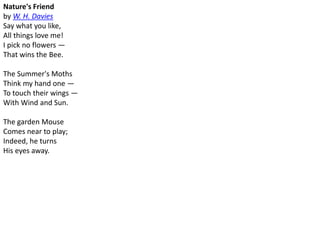NATURE’S FRIEND.pptx
- 1. NATURE’S FRIEND STD. 6TH SUBJECT : ENGLISH PPT. BY MRS. PARIMALA .S.JOSHI
- 3. The poet W.H. Davies wrote the poem “Nature’s Friend.” The poem is written in a tone that makes it look as if the author is praising himself since he is adored by everything in nature. The poet believes that it makes no difference to him what other people think of him since he knows he is cherished by nature. Theme Of The Poem The poem expresses the poet’s love, care and admiration for nature. The poet demonstrates his excellent behaviour for all organisms in nature by using the examples of bees, moths, cows, horses, and birds.
- 4. Nature's Friend by W. H. Davies Say what you like, All things love me! I pick no flowers — That wins the Bee. The Summer's Moths Think my hand one — To touch their wings — With Wind and Sun. The garden Mouse Comes near to play; Indeed, he turns His eyes away.
- 5. The Wren knows well I rob no nest; When I look in, She still will rest. The hedge stops Cows. Or they would come After my voice Right to my home. The Horse can tell, Straight from my lip, My hand could not Hold any whip. Say what you like, All things love me! Horse, Cow, and Mouse, Bird, Moth, and Bee.
- 6. Nature's Friend by W. H. Davies Say what you like, All things love me! I pick no flowers — That wins the Bee. The poet is speaking directly to the audience, and he confidently declares that no matter what the listeners think or feel about him, he believes that everything in nature loves him. This is due to the fact that he does not pick any flowers that are attractive to bees.
- 7. The Summer's Moths Think my hand one — To touch their wings — With Wind and Sun. Summer moths are not apprehensive about him, neither do they flee in fear. They imagine his hands to be like the wind and sun caressing their wings gently.
- 8. The garden Mouse Comes near to play; Indeed, he turns His eyes away. The garden mouse is daring enough to approach him for a game because it knows the poet will not hurt it, but it is also cautious of him.
- 9. The hedge stops Cows. Or they would come After my voice Right to my home. The poet is also friends with the cows grazing in the pastures. His voice is also well-known among them. When they recognized his voice calling to them, they would have followed him directly to his house if the boundaries of the fields hadn’t restrained them.
- 10. The Horse can tell, Straight from my lip, My hand could not Hold any whip. Davies proudly adds that his horse is aware that his hand is incapable of holding a whip since he has never misbehaved with him and could never be harsh to him.
- 11. Say what you like, All things love me! Horse, Cow, and Mouse, Bird, Moth, and Bee.
- 13. The Wren knows well I rob no nest; When I look in, She still will rest. The Wren (a little bird) is acquainted with the poet. When the poet peers at her nest, she doesn’t flutter around in worry. She will sleep well in her nest, knowing that the poet will not touch her eggs.
- 16. Nature is what we see and feel around us. Nature is like our mother who never scolds us unless we do anything wrong. I am happy to interact with nature and also happy to be a part of this earth. The nature is very attractive and full of my favorite green color. It provides us the air to breathe, the water to drink, the soil to make a home, and the land to stay. Nature gives us fruits, vegetables, and grains to eat. We should enjoy nature without disturbing its balance. Nature is a precious and notable gift given to us by god. Nature is our best friend. We should do plantation and nurturing to keep it healthy. We must keep our nature healthy, and peaceful.
- 17. HOME WORK: MEMORIZE THE POEM https://youtu.be/vTwZnfP9Cas https://youtu.be/MDVnPu0Eg5I
















